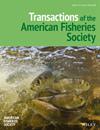Acoustic telemetry yields stock membership clues for Coho Salmon harvested in coastal fisheries
IF 1.4
3区 农林科学
Q2 FISHERIES
引用次数: 0
Abstract
ObjectiveEstimates of Pacific salmon声学遥测为沿海渔业捕捞的库鲑提供种群成员线索
目标需要对沿岸渔业捕捞的太平洋鲑鱼种群组成进行估计,以平衡捕捞机会和保护。现代种群分类工具(如基因种群识别)的分辨率不足,可能会阻碍一些小型渔业的渔获量分配、我们利用声学遥测技术调查了阿拉斯加诺顿湾地区商业捕捞的种群组成,方法是模拟当地渔业,在连续的 Shaktoolik 和 Unalakleet 商业分区的两个季节捕获并标记 578 条 Coho Salmon O. kisutch。性别、捕获地点和捕获时间是预测种群成员的因素。根据项目年(2020 年和 2021 年)的商业捕捞数据拟合的模型估计,沙克托利克分区 32.9% 的捕捞量为沙克托利克种群,51.5% 为乌纳拉克利特种群,其余为其他过渡性种群。相反,在 Unalakleet 分区上岸的库鲑中,86.7% 为 Unalakleet 种群,而 Shaktoolik 种群和过渡性种群分别占不到 10%。
本文章由计算机程序翻译,如有差异,请以英文原文为准。
求助全文
约1分钟内获得全文
求助全文
来源期刊
CiteScore
2.90
自引率
7.10%
发文量
48
审稿时长
8-16 weeks
期刊介绍:
Transactions of the American Fisheries Society is a highly regarded international journal of fisheries science that has been published continuously since 1872. It features results of basic and applied research in genetics, physiology, biology, ecology, population dynamics, economics, health, culture, and other topics germane to marine and freshwater finfish and shellfish and their respective fisheries and environments.

 求助内容:
求助内容: 应助结果提醒方式:
应助结果提醒方式:


